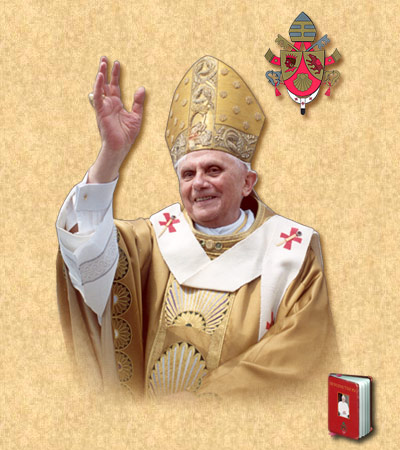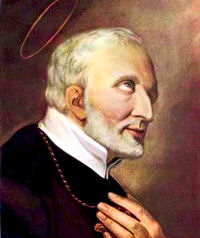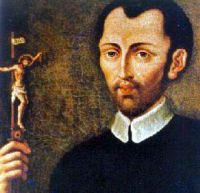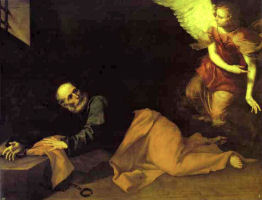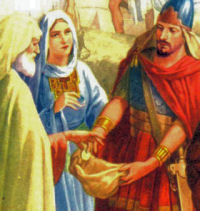Part 3: Life in Christ (1691 - 2557)
Section 2: The Ten Commandments (2052 - 2557)
Chapter 2: You Shall Love Your Neighbor as Yourself (2196 - 2557)
Article 4: The Fourth Commandment (2197 - 2257)
Jesus said to his disciples: "Love one another even as I have loved you."1 ⇡
Honor your father and your mother, that your days may be long in the land which the Lord your God gives you.4
He was obedient to them.5
The Lord Jesus himself recalled the force of this "commandment of God."6 The Apostle teaches: "Children, obey your parents in the Lord, for this is right. 'Honor your father and mother,' (This is the first commandment with a promise.) 'that it may be well with you and that you may live long on the earth."'7 ⇡
II. THE FAMILY AND SOCIETY ⇡
1603
1880
372
(all)
2207
The family is the original cell of social life. It is the natural society in which husband and wife are called to give themselves in love and in the gift of life. Authority, stability, and a life of relationships within the family constitute the foundations for freedom, security, and fraternity within society. The family is the community in which, from childhood, one can learn moral values, begin to honor God, and make good use of freedom. Family life is an initiation into life in society.
1.
Jn 13:34.
4.
Ex 20:12; Deut 5:16.
5.
Lk 2:51.
6.
Mk 7:8-13.
7.
Eph 6:1-3; cf. Deut 5:16.
2208
The family should live in such a way that its members learn to care and take responsibility for the young, the old, the sick, the handicapped, and the poor. There are many families who are at times incapable of providing this help. It devolves then on other persons, other families, and, in a subsidiary way, society to provide for their needs: "Religion that is pure and undefiled before God and the Father is this: to visit orphans and widows in their affliction and to keep oneself unstained from the world."12
12.
Jas 1:27.
1883
(all)
2209
The family must be helped and defended by appropriate social measures. Where families cannot fulfill their responsibilities, other social bodies have the duty of helping them and of supporting the institution of the family. Following the principle of subsidiarity, larger communities should take care not to usurp the family's prerogatives or interfere in its life.
2210
The importance of the family for the life and well-being of society13 entails a particular responsibility for society to support and strengthen marriage and the family. Civil authority should consider it a grave duty "to acknowledge the true nature of marriage and the family, to protect and foster them, to safeguard public morality, and promote domestic prosperity."14
13.
Cf. GS 47 § 1.
14.
GS 52 § 2.
2211
The political community has a duty to honor the family, to assist it, and to ensure especially:
· the freedom to establish a family, have children, and bring them up in keeping with the family's own moral and religious convictions;
· the protection of the stability of the marriage bond and the institution of the family;
· the freedom to profess one's faith, to hand it on, and raise one's children in it, with the necessary means and institutions;
· the right to private property, to free enterprise, to obtain work and housing, and the right to emigrate;
· in keeping with the country's institutions, the right to medical care, assistance for the aged, and family benefits;
· the protection of security and health, especially with respect to dangers like drugs, pornography, alcoholism, etc.;
· the freedom to form associations with other families and so to have representation before civil authority.15
15.
Cf. FC 46.
1931
225
(all)
2212
The fourth commandment illuminates other relationships in society. In our brothers and sisters we see the children of our parents; in our cousins, the descendants of our ancestors; in our fellow citizens, the children of our country; in the baptized, the children of our mother the Church; in every human person, a son or daughter of the One who wants to be called "our Father." In this way our relationships with our neighbors are recognized as personal in character. The neighbor is not a "unit" in the human collective; he is "someone" who by his known origins deserves particular attention and respect.
1939
(all)
2213
Human communities are made up of persons. Governing them well is not limited to guaranteeing rights and fulfilling duties such as honoring contracts. Right relations between employers and employees, between those who govern and citizens, presuppose a natural good will in keeping with the dignity of human persons concerned for justice and fraternity.
III. THE DUTIES OF FAMILY MEMBERS ⇡
The duties of children ⇡
1858
(all)
2214
The divine fatherhood is the source of human fatherhood;16 this is the foundation of the honor owed to parents. The respect of children, whether minors or adults, for their father and mother17 is nourished by the natural affection born of the bond uniting them. It is required by God's commandment.18
16.
Cf. Eph 314.
17.
Cf. Prov 1:8; Tob 4:3-4.
18.
Cf. Ex 20:12.
2215
Respect for parents (filial piety) derives from gratitude toward those who, by the gift of life, their love and their work, have brought their children into the world and enabled them to grow in stature, wisdom, and grace. "With all your heart honor your father, and do not forget the birth pangs of your mother. Remember that through your parents you were born; what can you give back to them that equals their gift to you?"19
19.
Sir 7:27-28.
532
(all)
2216
Filial respect is shown by true docility and obedience. "My son, keep your father's commandment, and forsake not your mother's teaching. ... When you walk, they will lead you; when you lie down, they will watch over you; and when you awake, they will talk with you."20 "A wise son hears his father's instruction, but a scoffer does not listen to rebuke."21
20.
Prov 6:20-22.
21.
Prov 13:1.
1831
(all)
2217
As long as a child lives at home with his parents, the child should obey his parents in all that they ask of him when it is for his good or that of the family. "Children, obey your parents in everything, for this pleases the Lord."22 Children should also obey the reasonable directions of their teachers and all to whom their parents have entrusted them. But if a child is convinced in conscience that it would be morally wrong to obey a particular order, he must not do so.
As they grow up, children should continue to respect their parents. They should anticipate their wishes, willingly seek their advice, and accept their just admonitions. Obedience toward parents ceases with the emancipation of the children; not so respect, which is always owed to them. This respect has its roots in the fear of God, one of the gifts of the Holy Spirit.
22.
Col 3:20; Cf. Eph 6:1.
2218
The fourth commandment reminds grown children of their responsibilities toward their parents. As much as they can, they must give them material and moral support in old age and in times of illness, loneliness, or distress. Jesus recalls this duty of gratitude.23 For the Lord honored the father above the children, and he confirmed the right of the mother over her sons. Whoever honors his father atones for sins, and whoever glorifies his mother is like one who lays up treasure. Whoever honors his father will be gladdened by his own children, and when he prays he will be heard. Whoever glorifies his father will have long life, and whoever obeys the Lord will refresh his mother.24
O son, help your father in his old age, and do not grieve him as long as he lives; even if he is lacking in understanding, show forbearance; in all your strength do not despise him. ... Whoever forsakes his father is like a blasphemer, and whoever angers his mother is cursed by the Lord.25
23.
Cf. Mk 7:10-12.
24.
Sir 3:2-6.
25.
Sir 3:12-13, 16.
2219
Filial respect promotes harmony in all of family life; it also concerns relationships between brothers and sisters. Respect toward parents fills the home with light and warmth. "Grandchildren are the crown of the aged."26 "With all humility and meekness, with patience, [support] one another in charity."27
26.
Prov 17:6.
27.
Eph 4:2.
2220
For Christians a special gratitude is due to those from whom they have received the gift of faith, the grace of Baptism, and life in the Church. These may include parents, grandparents, other members of the family, pastors, catechists, and other teachers or friends. "I am reminded of your sincere faith, a faith that dwelt first in your grandmother Lois and your mother Eunice and now, I am sure, dwells in you."28
28.
2 Tim 1:5.


